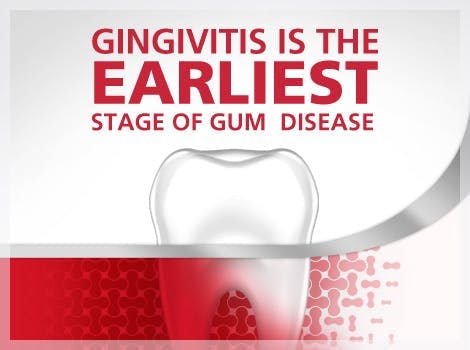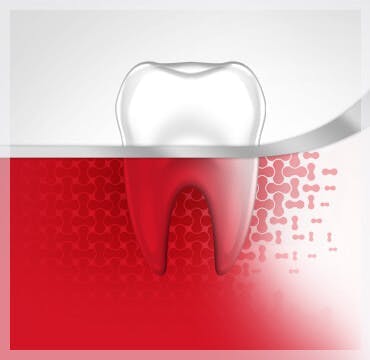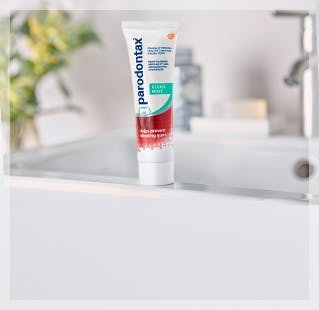Gingivitis is a mild form of gum disease. Often accompanied by bad breath, gingivitis causes sore, swollen and bleeding gums.i
The good news is that gingivitis is easily treated and prevented. You can help stop the disease in its tracks by stepping up your dental care routine at home to help prevent it from reoccurring.i But it helps to know why and how gingivitis happens, and who is potentially more at risk, to best protect your oral health.

What Does Gingivitis Look Like?
Gingivitis is the earliest stage of gum disease. It usually causes redness, swelling and bleeding of the gum tissue. Your gums may also feel tender to the touch.i
Gingivitis is fairly common. In fact, nearly half of all adult Americans aged 30 and over have some form of gum disease.ii Gingivitis can progress to a more severe form of gum disease if left untreated.iii That's why it's important to look out for the early symptoms and signs of gingivitis.
How Do You Get Gingivitis?
Gingivitis is a bacterial infection of the gums. It is caused when plaque – a thin, sticky film of bacteria – builds up on your teeth and gums. If not removed by daily brushing and flossing, this plaque can irritate your gums, causing swelling, soreness and bleeding.i, iii
Plaque that is left on your teeth can harden under your gum line into tartar, which is harder to remove and irritates your gum line. If you do nothing about gingivitis, it can lead to more serious issues such as periodontitis (a more advanced form of gum disease) and eventually tooth loss and gum damage.iii
Find out more about the causes of gingivitis.
Is Gingivitis Contagious?
No, gingivitis isn’t caused by person-to-person contact. Anyone can develop gingivitis, but there are some factors that can put you at a higher risk. They include:i
- Poor oral health
- Smoking or chewing tobacco
- Having a family history of gum disease
- Pregnancy
- Diabetes
- Taking certain medications (including steroids and some oral contraceptives)
Does Gingivitis Affect Women More Than Men?
Hormonal changes can put women at a higher risk of gingivitis at certain times in their life – including puberty, pregnancy and menopause. This is because female hormones (estrogen and progesterone) released during these periods cause an increased blood flow to the gums, making them more sensitive to plaque build-up and gum irritation.
As a result, some women may experience inflamed, swollen or bleeding gums during times of hormonal change – so it’s a good idea to pay extra attention to your oral health at these stages.iv
Are Children at Risk of Gingivitis?
Yes. Chronic gingivitis is very common in children, causing the same symptoms of swollen and bleeding gums. As with adults, it is treatable and preventable with a regular routine of brushing, flossing and visits to the dentist.v
Early Stages of Gingivitis and Treatment
Think of gingivitis as the initial warning stage of gum disease – where your body is trying to alert you to the fact something is wrong. If treated quickly and properly with good home dental care and regular visits to your dentist, you should see the return of healthy gums within days or weeks.i, vi Ignoring gingivitis, on the other hand, can lead to periodontitis. This stage of gum disease cannot be treated at home.iii
Learn more about the stages of gum disease.
How to Prevent Gingivitis
With just a few lifestyle changes there are a few easy ways to reduce your chances of developing plaque-induced gingivitis, including:vii
- Visiting your dentist or dental hygienist for regular check-ups. Professional cleaning can also help to remove plaque from hard-to-reach areas of your mouth.
- Adopting a balanced diet to help keep gums healthy. Be sure to eat a nutritious diet that is rich in fruits and vegetables – and limits sugary drinks and snacks.
- Brushing your teeth for two minutes twice a day. You should also aim to floss your teeth at least once a day to remove any remaining plaque and food debris from your mouth in between meals.
- Choose the right toothpaste. Discover how to choose the right toothpaste to help reverse gingivitis.
What is Gingivitis? – Next Steps
Good oral care is paramount in preventing gingivitis. But by brushing your teeth twice a day and using a toothpaste such as parodontax Complete Protection, you can greatly lessen your chances of developing gingivitis. paradontax is clinically proven to help reverse gingivitis and improve your gum health.
Want to know more? Here’s where you can learn more about gingivitis and how it can affect your health.
SOURCES
By clicking any of the links below you will be taken to an external website that is independently operated and not managed by GSK. GSK assumes no responsibility for the content on the website. If you do not wish to leave this website, do not click on the links below:
- Gingivitis. Mouth Healthy. https://www.mouthhealthy.org/en/az-topics/g/gingivitis. Accessed 01/03/20.
- Periodontal Disease. Centers for Disease Control and Prevention. https://www.cdc.gov/oralhealth/conditions/periodontal-disease.html. Accessed 09/06/22.
- Gingivitis. Mayo Clinic. https://www.mayoclinic.org/diseases-conditions/gingivitis/symptoms-causes/syc-20354453. Accessed 01/03/2020.
- Hormones and Dental Health: What Every Woman Needs to Know. Mouth Healthy. https://www.mouthhealthy.org/en/az-topics/h/hormones. Accessed 09/04/20.
- FAQ. Can children be at risk for developing periodontal disease? American Academy of Periodontology. https://www.perio.org/for-patients/faqs/#1558540356617-97e07e2e-6042. Accessed 09/06/22.
- Gingivitis Diagnosis and Treatment. Mayo Clinic. https://www.mayoclinic.org/diseases-conditions/gingivitis/diagnosis-treatment/drc-20354459. Accessed 01/06/2020.
- Brushing your teeth. Mouth Healthy. https://www.mouthhealthy.org/en/az-topics/b/brushing-your-teeth. Accessed 09/04/20.





